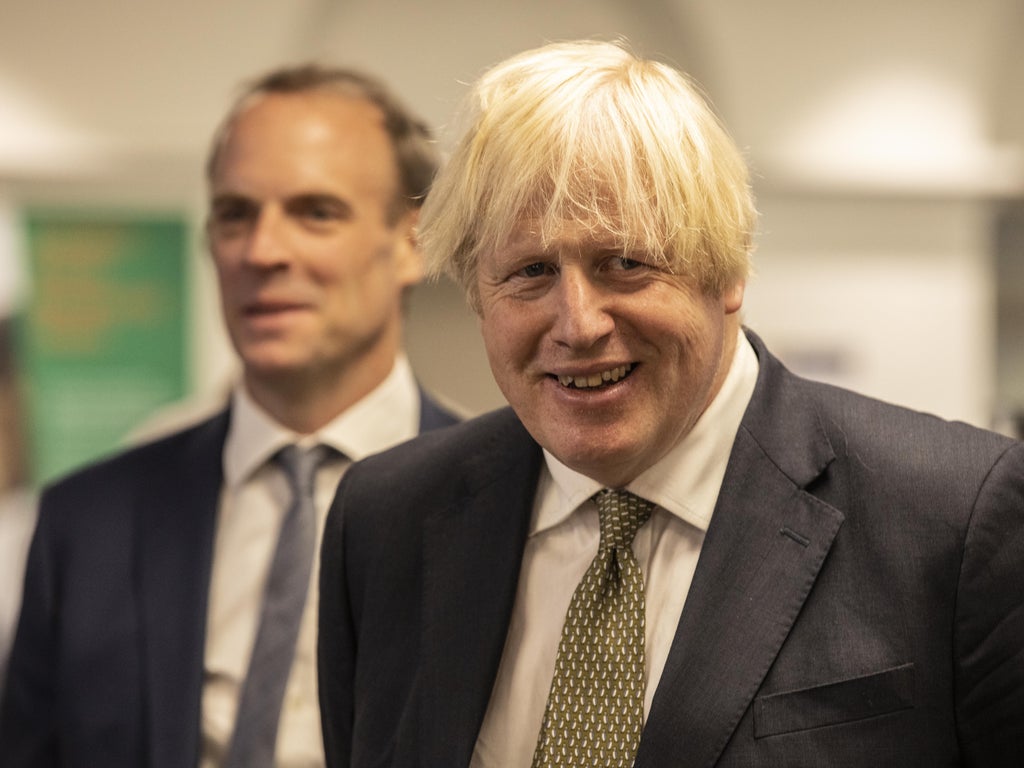
Boris Johnson has clashed with his deputy prime minister Dominic Raab over the Partygate scandal, by refusing to endorse the justice secretary’s admission that laws were broken in No 10.
Mr Raab’s comment came after 24 hours in which Downing Street had refused to accept that Metropolitan Police fines for 20 lockdown breaches amounted to proof of law-breaking.
But Mr Johnson stuck to the official line when grilled on the issue by a parliamentary committee, insisting he would not comment on Partygate until the Met inquiry is completed and Whitehall mandarin Sue Gray’s report published.
The prime minister faced calls to resign over what Labour said was clear evidence of “criminality” under his watch at Downing Street – with one MP telling him to his face: “You’re toast.”
The PM’s silence prompted speculation that he fears anything said now could backfire later if he receives a fixed penalty notice (FPN) himself.
The issue could turn out to be vital to Mr Johnson’s future, as it will be more difficult for him to cling on to office if it is shown that he broke the law or misled parliament.
Mr Raab may have denied the PM a potential line of defence against accusations of law-breaking with his comments in a round of broadcast interviews on Wednesday morning, in which he said that it was “inevitably” the case that FPNs were issued only to “those that have breached the regulations”.
The cabinet minister also accepted that Mr Johnson may have said things “that turned out not to be true” when he assured MPs in the House of Commons that no rules were broken in No 10.
But he insisted that there was no “intention to mislead”, as the PM had been “updating parliament to the best of his knowledge and understanding”.
Under sustained questioning during a 90-minute session of the House of Commons Liaison Committee, Mr Johnson repeatedly insisted he would not provide a “running commentary” on the Partygate inquiry and would not speak publicly about it until the process was concluded.
After he declined to say whether he had himself received an FPN, Pete Wishart, an SNP MP, told him: “Prime minister we’re not expecting you to give a running commentary, quite obviously. But if you have… you’re pretty much toast aren’t you?”
But Mr Johnson told Mr Wishart: “I have been, I hope, very frank with the House about where I think we have gone wrong and the things that I regret, that I apologise for.
“But there is an ongoing investigation... I am going to camp pretty firmly on my position. I won’t give a running commentary on an ongoing investigation.”
Earlier, the prime minister faced calls of “resign” as he deflected questions over Partygate in the House of Commons.
Sir Keir Starmer told Prime Minister’s Questions that the Met’s decision to issue fines indicated there was “widespread criminality” in Mr Johnson’s Downing Street.
“The ministerial code says that ministers who knowingly mislead the House should resign,” said the Labour leader. “Why’s he still here?”
Mr Johnson replied: “Of course the Met, the investigators, must get on with their job but in meantime we’re going to get on with our job.”
Sir Keir retorted that the PM was either “trashing the ministerial code or he’s claiming he was repeatedly lied to by his own advisers, that he didn’t know what was going on in his own house and his own office”.
Accusing Mr Johnson of believing he can “pass off criminality in his office and ask others to follow the law”, Sir Keir asked: “When is he going to stop taking the British public for fools?”
A Labour spokesperson later said that it was “totally untenable” for Downing Street to “refuse to acknowledge what is a statement of fact and law – and that is that the issuing of 20 fixed penalty notices proves that there has been criminality in Boris Johnson’s Downing Street”.
Liberal Democrat chief whip Wendy Chamberlain, a former police officer, said: “It is completely absurd that Boris Johnson still won’t accept that the lockdown parties in Downing Street broke the law.
“This stubborn denial flies in the face of the evidence. It shows that Johnson hasn’t learnt any lessons from this scandal and is still taking the British people for fools.
“As a former police officer I know what people do to get out of answering questions. These excuses wouldn’t cut it then and they won’t cut it now with the public.”







